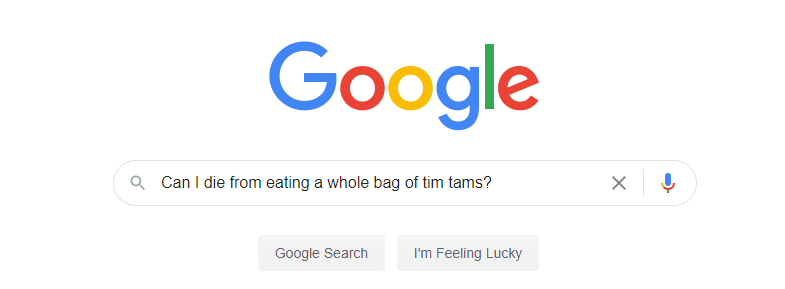I currently work for a great company called Xero doing all sorts of fun data things. When you're reading my articles I need you to understand that my words are my own, I'm not speaking on behalf of my employer and If i'm talking about something negative in the field that may not be indicative of Xero, I've worked many interesting roles and I read a lot about my field.
Open letters seem to be the new way tech throw their weight around, sometimes it’s for good (example) and sometimes it’s for evil (example).
Today we an open letter from Google. And it’s bad. Link.
The letter pushed on Googles Search Engine and YouTube pages outlined how the upcoming Australian News Media Bargaining Code would not only ‘hurt’ their services, but more importantly ‘hurt’ you, the loyal customer they care so deeply about.
The code, currently only aimed at Facebook and Google (Facebook’s open letter probably pending) is designed to address the inequalities that come where these major digital companies can behave like monopolies.
The kind of behavior that means Australian news companies may loose out on ‘airtime’ to multi-billion media companies willing to outbid them, or where Australian news companies have to accept less favorable agreements with Facebook and Google because other parties can pay more money, or where Australian news stories show up on Facebook feeds or Google Search results without receiving any of the ad revenue each company makes from those interactions.
In a letter straight out of the PR handbook, and later signed by Australia’s Managing Director to give it that personal touch, Google claims that having to give space to local Australian news media is very very very bad for Australians.
How bad?
Well this is where things go a bit sideways…
Apparently it puts your google search data at risk.
What does that have to do with the news I hear you say?
Well the code has some key stipulations that the big G and F must comply with to ensure that the code is being fairly applied.
The first is that they must proactively give notice of any changes to the algorithm. Secondly, they must recognize the news as original content, and thirdly they must provide usage data on users interacting with the news content.
It’s that last one google is crying foul of. Effectively the code mandates that Google must provide user data to prove that Google isn’t fudging the numbers.
So is your personal data at risk?
No more than usual.
If you read their privacy policies(Facebook, Google), it’s absolute standard practice to share non-personally identifiable data with third parties. Google explicitly says:
We may share non-personally identifiable information publicly and with our partners — like publishers, advertisers, developers, or rights holders. For example, we share information publicly to show trends about the general use of our services. We also allow specific partners to collect information from your browser or device for advertising and measurement purposes using their own cookies or similar technologies.
Nowhere in the code does it say personally identifiable data, it merely wants to know what demographics are clicking their links so that they can cater their content, because even news outlets still have to do good marketing. Performance and engagement data is something Google and Facebook have always provided their partners, and this isn’t any different.
Which means, no, Google won’t be sharing your search history with Australian News sites.
Google’s entire profit model is built off of your user data helping them sell trends and usage metrics. They have offered every single person and company who uses their services the ability to see who is engaging with their content. So to pivot and complain that they will be forced to provide usage data is a deliberate scare tactic to confuse those who don’t understand just how much of your data Google uses and abuses.
They’ve threatened to make Australians pay for Google.
Google claims this code ‘hurts the free service you use.’
Read this, and read it again until you realize the thinly veiled threat that it us.
It’s currently free to use Google Search, Google News,Google Discover, and YouTube. What’s the only thing that could risk a free service?
Having to pay for it.
Does the new code enforce that Google should charge for their products. Nope.
This means Google is threatening to charge Australians to use their free services, if they don’t get their way.
Wow this Open letter went from nice to ‘nice search engine shame if something happened to it’ real quick.
If nothing else it tells you Google is in the wrong here it should be that the first thing you heard from Google about this code was a bold faced threat.
Another fun claim in the open letter is that apparently the code also gives Big Media Companies Special Treatment, and unfairly benefits large media companies.
So let’s dive in and take a closer look at which Big Media Companies the code says is eligible:
- Companies whose annual revenue must exceed $150k on average. While this excludes small news companies $150k revenue is more ‘medium’ sized company, not big.
- Outlets that predominantly produce ‘core news’ and publish online. Which means places that cover political, crime, and works journalism. Not gossip mags.
- Outlets that adhere to professional editorial standards
- They maintain editorial independence from the subject of their news coverage: Which means controlled media, fake news, magazines, politically owned, or influenced media companies are not eligable.
- They operate primarily in Australia for the purpose of serving Australians.
Not exactly the scary Big Media Company version of Big Brother.
The code won't actually cover a lot of Australian media companies, just primarily national and state news companies. This is a major lifeline to local newspapers which are vital for a functioning democracy, doing so much to push transparency at the local level. It also takes a stand against fake news and outside influences in the media Australians are exposed to. This allows a fighting chance in case Russia decides to try and turn the next election using the same news influencing tactics in 2016. (link)
So that's what the code outlines is it’s rules to play by.
But what are Googles own rules on ensuring their services don’t unfairly benefit big media companies?
Interestingly, the open letter doesn’t cover that, though they did say ‘You’ll hear more from us in the coming days — stay tuned.” so maybe it’s coming, but the open letter does say one thing that’s important to note:
we already pay them millions of dollars and send them billions of free clicks every year.
The reason why I draw your attention to this is that it’s not relevant. The code isn’t arguing that the news media companies don’t already earn money and get free clicks, the code seeks to address the fundamental bargaining power imbalance caused by Google allowing other media companies to outbid them, or where google earns money off the news coverage but doesn’t pass a cut of the revenue on.
Google is claiming that what is currently in place is fair and that Google is being unfairly hard done by and unrewarded for their charity.
It’s an attempt to protect the major beneficiaries of the status quo, the global media conglomerates, NOT the consumer.
I always get my hackles up when large companies take to writing ‘open letters’.
Traditionally an open letter is something the downtrodden use to get their voice heard, however its recently become a new tactic where large companies use it to attack something they can’t sue.
It’s a marketing scheme used to turn Australians against their government in favor of the company that is earning billions and billions of dollars in profit off of everything you search, every gmail you send, and every YouTube video you watch.
An organization who time and again has demonstrated they have no loyalty to you, the average consumer.
Australians are being used as pawns to protect Googles right to absolute control over how they conduct their business. There is no clear risk here, Google just doesn’t want to be told what to do, no search history will be shared, no content creator will get less views and no media company will be given unfair special treatment.
This has all happened before by the way. This is no different to what happened to news via the airways, when TV channels had to meet certain standards.
Now Google will have to be transparent about usage and fairly negotiate with Australian News Companies on advertising, accurately identify original content, and pay them a cut of the revenue they earn. The only thing being lost here is Google’s chance to profit from anyone with deep enough pockets to shove their content to the front of the queue.
Have your say!
The ACCC is accepting written submissions from anyone in the world to voice their concerns on the code.
Written submissions are due by 5 pm on 28 August 2020 and can be sent to bargainingcode@accc.gov.au.
Reminder: All views expressed here are my own and do not represent my employer, Xero.
Who am I?


 Ron-Resist Racism-Soak 🏳️🌈🇳🇿@ronsoak
Ron-Resist Racism-Soak 🏳️🌈🇳🇿@ronsoak Hi, I'm Ron!
Hi, I'm Ron!
🛰️ I ❤️ space!
☕ Coffee Addict
📊 Data Analysis Team Lead for @Xero
⚠️ My words are my own.
✍️ Writer on @ThePracticalDev (dev.to/ronsoak)
✍️ Writer on @Medium (medium.com/@ronsoak)
|🇳🇿 |🇬🇧 |🏳️🌈11:11 AM - 29 Jun 2020























